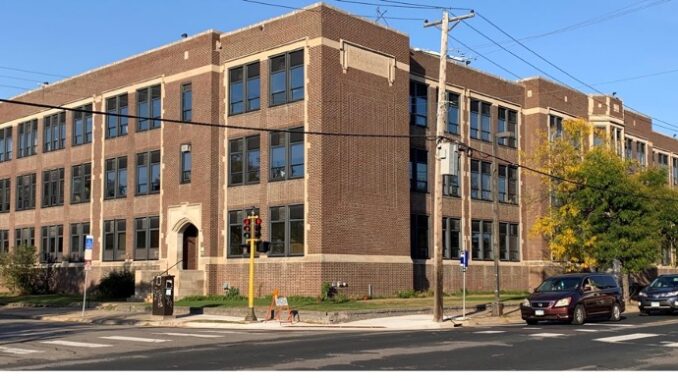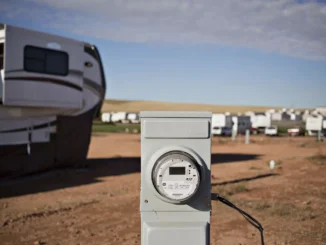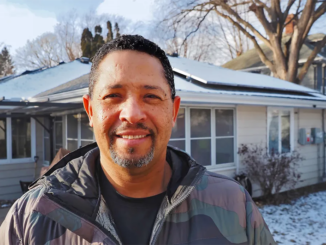
A major federal grant will help Xcel Energy restart a Minneapolis microgrid project delayed earlier this year over cost concerns.
Xcel Energy received a $100 million grant last week from the U.S. Department of Energy’s Grid Resilience and Innovation Partnerships program for resiliency and wildfire mitigation initiatives, including the Resilient Minneapolis Project. The utility also agreed to invest $140 million in the partnership grant.
The Resilient Minneapolis Project is an effort to build microgrids at the Minneapolis American Indian Center, the Sabathani Community Center and a resiliency hub in North Minneapolis. The utility had offered to provide and own battery storage systems at all three sites but pulled out in June, citing escalating costs.
Minnesota Public Utilities Commission member Valerie Means applauded Xcel’s decision to get the project back on track.
“I appreciate the company’s pursuit of federal funds to support these investments in BIPOC communities,” she said. “The project had and has significant widespread support from stakeholders and site hosts, and many community organizations in Minneapolis.”
Means supports the project because it will provide resiliency hubs in diverse, low-income neighborhoods that often suffer outages during severe weather events. She said the commission was disappointed by Xcel’s decision to withdraw from the project earlier this year. After accepting Xcel’s withdrawal, the commission ordered the utility to file a new plan for moving forward within 180 days.
The project is part of a national movement by cities to create resilience hubs in disadvantaged neighborhoods. The city of Minneapolis began discussions with Xcel in 2019 focused on innovative clean energy-related pilots. Following the COVID-19 outbreak and the murder of George Floyd, the utility and the city decided on a proposal to build resiliency hubs in marginalized BIPOC communities.
The nonprofits selected are community centers in their neighborhoods that offer food shelves and other social services. Each is undergoing physical repairs — new roofs, an expansion, a necessary HVAC investment — this year and will be ready for microgrid installations next year. If and when severe weather or other challenges emerge, the microgrids will power the community centers, allowing first responders to offer medical care and residents to seek shelter, charge appliances and access food shelves.
Xcel planned to spend $9 million in ratepayer money to install batteries at the three sites, with the nonprofits agreeing to buy solar panels and some equipment needed for their projects. In June, Xcel backtracked, saying battery storage system and supply chain issues had increased costs by 70% to $17.7 million. The withdrawal came a week after the Public Utilities Commission rejected half of Xcel’s requested electricity rate increase.
In a recent update to the commission, Xcel said it will use $9 million of the DOE grant for the Resilient Minneapolis Project. The commission earlier permitted Xcel to use $9 million in ratepayer money for the project. With the Resilient Minneapolis Project budget for battery storage now doubled to $18 million, Xcel will have enough money to cover increased costs without ratepayer exposure.
In an Oct. 18 letter to the commission about restarting the microgrid program, Xcel wrote that “there are many details to be worked out, but we wanted to share this exciting news as quickly as possible.”
Jamez Staples, founder of Renewable Energy Partners, developed the North Minneapolis Resiliency Hub, one of the three sites. The hub would place part of the microgrid on two schools and a nutrition center near Staples’ training and apprenticeship center. Renewable Energy Partners collaborated with Xcel and the other two nonprofits during the planning process for the Resilient Minneapolis Project.
Staples and his partner, Michael Krause of Kandiyo Consulting, question Xcel’s proposal to own the battery storage units. They believe the project members should possess the battery systems and use them to reduce their electricity bills.
“We’re still not in favor of the idea of Xcel owning the batteries,” Staples said. “We are focused more on community ownership for the microgrids and having the facilities utilize the solar and store the power that they could deploy during peak demand hours and have lower energy bills.”
Krause said resiliency still has a central role in the project. Minnesota has few microgrids today, making it imperative that the Resilient Minneapolis Project show the technology provides grid and community benefits. “We want to make sure that the models we’re creating are useful to other communities and show that [microgrids] can be done cost-effectively,” he said.
Xcel said it would collaborate with other Resilient Minneapolis Project partners and update the commission on the project in December.



